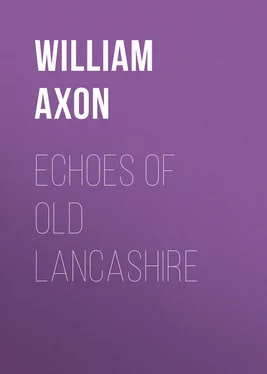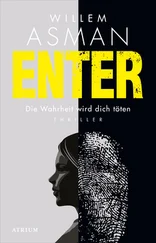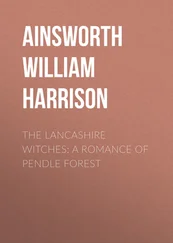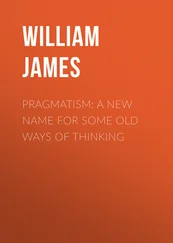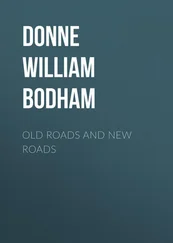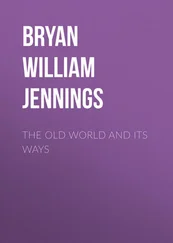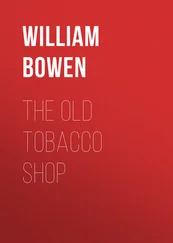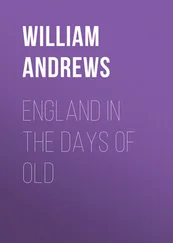William Axon - Echoes of old Lancashire
Здесь есть возможность читать онлайн «William Axon - Echoes of old Lancashire» — ознакомительный отрывок электронной книги совершенно бесплатно, а после прочтения отрывка купить полную версию. В некоторых случаях можно слушать аудио, скачать через торрент в формате fb2 и присутствует краткое содержание. Жанр: foreign_antique, foreign_prose, на английском языке. Описание произведения, (предисловие) а так же отзывы посетителей доступны на портале библиотеки ЛибКат.
- Название:Echoes of old Lancashire
- Автор:
- Жанр:
- Год:неизвестен
- ISBN:нет данных
- Рейтинг книги:3 / 5. Голосов: 1
-
Избранное:Добавить в избранное
- Отзывы:
-
Ваша оценка:
- 60
- 1
- 2
- 3
- 4
- 5
Echoes of old Lancashire: краткое содержание, описание и аннотация
Предлагаем к чтению аннотацию, описание, краткое содержание или предисловие (зависит от того, что написал сам автор книги «Echoes of old Lancashire»). Если вы не нашли необходимую информацию о книге — напишите в комментариях, мы постараемся отыскать её.
Echoes of old Lancashire — читать онлайн ознакомительный отрывок
Ниже представлен текст книги, разбитый по страницам. Система сохранения места последней прочитанной страницы, позволяет с удобством читать онлайн бесплатно книгу «Echoes of old Lancashire», без необходимости каждый раз заново искать на чём Вы остановились. Поставьте закладку, и сможете в любой момент перейти на страницу, на которой закончили чтение.
Интервал:
Закладка:
Such, in brief, was the evidence of Lunt, deviating often from the tenour of his previous depositions, which had been made before he had been under the moulding influences of Aaron Smith, that unscrupulous Jacobite hunter, whose duty it was to manage these little matters, to procure witnesses and favourable juries. Favourable judges were supplied by his betters. And to fully understand the gravity of the prisoners’ position it should be recollected that they could not have the assistance of counsel; their witnesses could not be compelled to attend; they were ignorant of the witnesses to be produced against them; and, until they stood in the dock, had not heard the indictment against them. Every circumstance was in favour of the crown. Lunt’s evidence was corroborated by Womball, a carrier, and one Wilson, who had been branded for roguery, as to the delivery of commissions and arms. Colonel Uriah Brereton (a saddler’s apprentice and common sharper) testified that he had received money from Sir Roland Stanley for the service of King James. This worthy Captain Bobadil being asked if he was not poor and necessitous when he received these gifts, cried out, in true ruffler style, “Poor! That is a question to degrade a gentleman.” The remaining evidence we need not go into, save that of John Knowles, who, having been sworn, declared “by fair yea and nay, he knew nout on’t.”
Then, after short speeches by Stanley and Dicconson, the witnesses for the defence were examined. The first half-dozen made some damaging attacks upon the character of John Lunt, representing him as a mean scoundrel, a bigamist, and a notorious highwayman. Then Lawrence Parsons, his brother-in-law, testified that he had been invited by Lunt to aid him in denouncing the Lancashire gentlemen, but had refused the offer of 20s. per week and £150 at the end, rather than “swear against his countrymen that he knew nothing against.” Mr. Legh Bankes, a gentleman of Gray’s Inn, told how Taafe, an intimate friend of Lunt’s, and who was expected to be a witness for the crown, had been to the wife of Mr. Dicconson, and revealed to her the whole design of Lunt, offering to introduce some friend of the prisoner’s to Lunt, as persons likely to be serviceable in any swearing that might be needed to hang the prisoners. Mr. Bankes was suspicious of this being a trap; but having been introduced to Lunt, that worthy, over a glass of ale, very frankly said that he wanted gentlemen of reputation to back his own evidence, and if Bankes would join he should be well provided for. He produced his “narrative of the plot,” and Taafe read aloud this manuscript, which named several hundreds besides the prisoners. “Why were these not taken up also?” inquired Bankes. Lunt’s answer was, “We will do these people’s business first, and when that hath given us credit, we will run through the body of the nation.” When the next witness arose, Lunt and Aaron Smith must surely have trembled, for it was their old friend Taafe, who, after adding his testimony to Lunt’s villainous character, gave a brief account of that worthy gentleman’s career as a discoverer of plots. How the first one he discovered (it was in Kent) came to nothing, as he had failed to find corroborative evidence; and how he was near failing again from the same cause; how Aaron Smith had edited and improved his original narrative. Lunt wanted Taafe as a witness, complained that the men he had hired to swear were blockish, and of such low caste as to carry little weight. Could Taafe introduce him to some gentleman – (God save the mark!) – willing to perjure his soul, consign innocent men to the scaffold, and receive blood-money from Aaron Smith? Taafe, from some motive not clear, determined to baulk the villany of his fellow-informer, hence the circumstances narrated by Mr. Legh Bankes, whose suspicions of treachery had prevented a full discovery. Taafe had partially opened his mind to the Rev. Mr. Allenson, who had also distrusted him in a similar manner. In Roger Dicconson, brother of the prisoner, he found a bolder and more adventurous spirit. The evidence of Mr. Allenson need not be analysed. He was followed by Mr. Roger Dicconson, who told how he was introduced at a coffee-house in Fetter Lane, by Taafe to Lunt, as a proper person to aid in the plan. Dicconson called himself Howard, a member of the Church of England, willing to join in the plot for a valuable consideration. Lunt said they had gold in for £100,000 a year, and that the informants were to have a third of the forfeited estates. He asked Lunt if he knew Dicconson’s brother, and Lunt, all unconscious that he was sitting face to face with him, replied, “Yes, very well; for he had delivered commissions to Hugh and Roger Dicconson about Christmas!”
Many more witnesses were examined, some of whom established that certain of the prisoners were not in the neighbourhood of Croxteth and Dukenhalgh at the time of the alleged Jacobite meetings at those places; whilst others gave most damaging evidence as to the utter rascality of Lunt and his chief witnesses – Womball, Wilson, and Brereton. The judge, in his summing up, contented himself with saying that the matter deserved great consideration, in which opinion the jury did not agree, for, after a short consultation, and without leaving court, they returned for each prisoner a verdict of Not Guilty. Mr. Justice Eyres then discharged them, with an eulogy upon the merciful and easy Government under which they lived, and advised them to beware of ever entering into plots and conspiracies against it. Lord Molyneux, Sir William Gerard, and Bartholomew Walmsley, Esq., were then put to the bar, but, no witnesses appearing, they were also declared Not Guilty, which gave Mr. Justice Eyres an opportunity for another cynical speech, concluding with these words: “Let me therefore say to you, go and sin no more, lest a worse thing befall you.” As they had just been pronounced innocent, the meaning and fitness of his remarks are somewhat questionable. But if his bias prejudiced him against the prisoners, they would have compensation in the popular satisfaction at their acquittal. Manchester went mad with joy. Lunt and his merry men were pelted out of the town, and only escaped lynching by the intervention of the prisoners’ friends; and all concerned in the prosecution came in for a share of popular hatred. The peril which the Lancashire gentlemen thus strangely escaped was a very great one, but the peril which the country escaped was greater still, for had there been wanting the disaffection of Taafe to his brother rascal Lunt, the courage and address of Roger Dicconson, and the honesty of the Manchester jury, England might have seen a repetition of the atrocities of Titus Oates and William Bedloe; might have seen a bigamist highwayman going from shire to shire and fattening on the blood and ruin of the best of her nobles and gentlemen.
Читать дальшеИнтервал:
Закладка:
Похожие книги на «Echoes of old Lancashire»
Представляем Вашему вниманию похожие книги на «Echoes of old Lancashire» списком для выбора. Мы отобрали схожую по названию и смыслу литературу в надежде предоставить читателям больше вариантов отыскать новые, интересные, ещё непрочитанные произведения.
Обсуждение, отзывы о книге «Echoes of old Lancashire» и просто собственные мнения читателей. Оставьте ваши комментарии, напишите, что Вы думаете о произведении, его смысле или главных героях. Укажите что конкретно понравилось, а что нет, и почему Вы так считаете.
